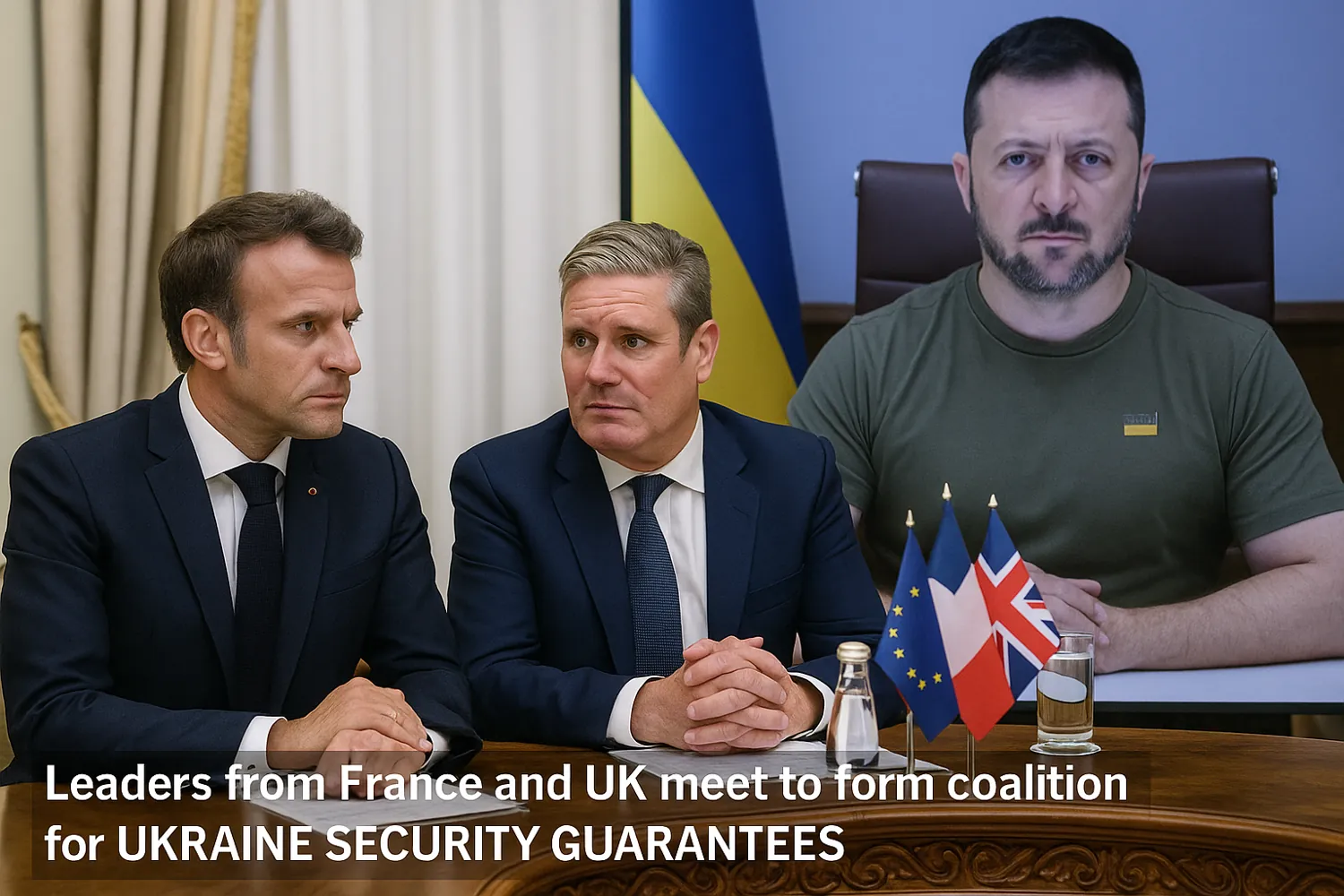NATO hesitates, others act — but is it too late?
Ukraine security guarantees are finally gaining traction — but not through NATO. Instead, a so-called “coalition of the willing” led by France and the UK is taking shape. For Kyiv, it’s a lifeline. For Russia, a provocation. And for Washington? Yet another strategic shrug. Once again, Europe moves while America dithers.
Context: France and UK propose new security pact
On September 1st, European leaders convened in Paris to launch discussions on long-term security guarantees for Ukraine. The initiative, spearheaded by French President Emmanuel Macron and UK Prime Minister Keir Starmer, seeks to solidify Ukraine’s defense position even without full NATO membership.
Key points:
- The proposed pact includes advanced weapons deliveries, intelligence sharing, and joint training.
- Germany, Poland, and the Baltic states have expressed interest.
- The U.S. has offered verbal support — but no binding commitments.
- Ukraine’s President Zelenskyy joined the talks via video, demanding clarity and urgency.
While the format is new, the dilemma isn’t: how to protect Ukraine without provoking Russia further?
Oppositional Argument: NATO’s delay created this vacuum
Let’s say it outright — the West’s failure to grant Ukraine NATO membership after 2014 was not “strategic patience.” It was strategic negligence.
Had NATO acted in 2015, the war of 2022 might have been avoided altogether. Instead:
- Ukraine was armed in pieces and phases.
- Western leaders oscillated between appeasement and escalation.
- Putin exploited ambiguity.
Now, with Ukraine bleeding and NATO paralyzed, a patchwork alliance emerges. It’s not a plan. It’s a salvage mission.
Ukraine security guarantees should not be improvisation. They should be doctrine.
Analytical Breakdown: What this new alliance really means
France and the UK — an unlikely duo
Traditionally, Paris and London have diverged on military matters. Brexit made things worse. Yet here they are, co-leading Europe’s most daring military pact since Kosovo. Why?
- Macron sees this as a chance to revive EU strategic autonomy.
- Starmer seeks to erase the Conservative legacy of Ukraine hesitation.
- Both know the U.S. may pull back after 2024 elections.
This is hedging — not just against Russia, but against Washington’s retreat.
The structure of guarantees
This is not Article 5. This is something looser, yet still potent:
- Pre-positioned weapons systems
- Real-time battlefield intel
- No-fly zones over key civilian infrastructure (under discussion)
- Fast-track arms resupply protocols
Unlike NATO, where consensus stifles action, this coalition may act without unanimity — and that’s exactly what Kyiv needs.
Russia’s predictable outrage
Putin immediately denounced the plan as “Western interference” and threatened “military-technical retaliation.” Translation? He’s scared it might work.
Russia prefers vague neutrality. Concrete guarantees are harder to manipulate.
Human Perspective: The cost of delay
Talk to Ukrainian soldiers near Kupiansk or civilians in Kharkiv, and the story is the same:
- “We’ve been dying waiting for the West to decide.”
- “One day we’re promised jets. The next, silence.”
- “Why is our blood cheaper than Article 5?”
For millions, Ukraine security guarantees aren’t about NATO speeches. They’re about whether their city survives the next missile wave.
And yet, while tanks take months to arrive, funerals happen daily.
Counterarguments
“This undermines NATO unity.”
Unity? Where was it when Germany blocked Leopard tank exports? When Hungary stalled EU sanctions?
“Russia will escalate.”
It’s already using hypersonics, conscription, and genocide rhetoric. There’s little room left for escalation — except defeat.
“Ukraine needs peace, not arms.”
Peace without security is surrender. And Ukraine has already tried peace. It got Crimea and Donbas stolen in return.
Conclusion: Make the guarantees real — or bury the word
Ukraine security guarantees are either the birth of a credible European defense doctrine — or another empty headline in a war-torn timeline.
The coalition of the willing may be late, imperfect, and untested. But it’s movement. And in a war of attrition, movement is life.
What Ukraine needs now isn’t applause. It’s armor.
What Russia fears most isn’t sanctions. It’s solidarity with teeth.
If NATO won’t write the doctrine, let others draft it in bold ink. But let’s stop pretending vague support equals protection. Because in Ukraine, delay is written in blood.
External Links
- The Guardian: Coalition of willing to discuss Ukraine security guarantees
- Politico: Macron, Starmer lead Ukraine pact talks
